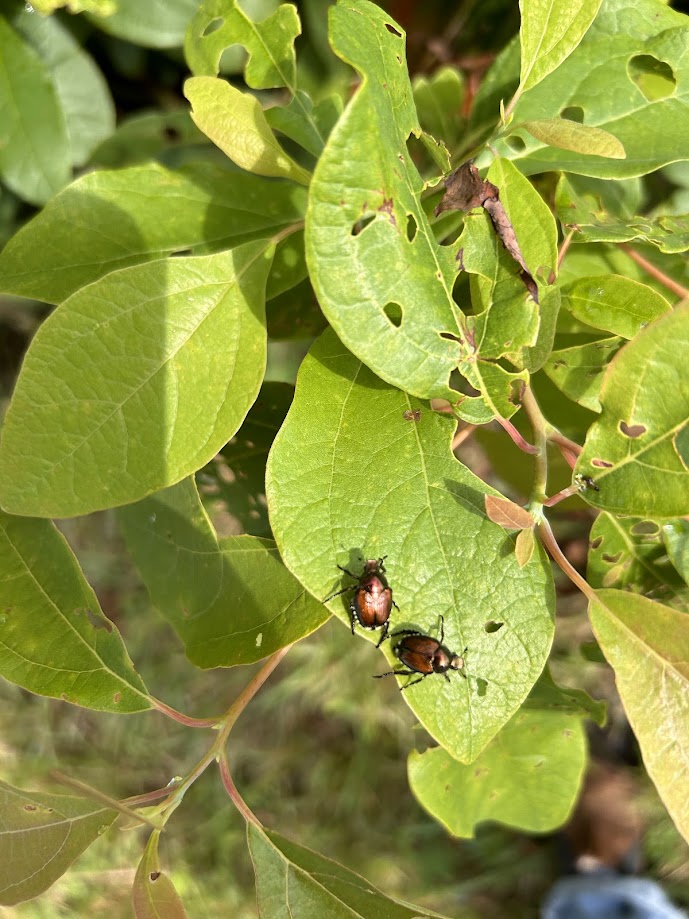Southwest Michigan small fruit update – July 24, 2024
The weather is going to heat up through the week.

Weather
The weather is expected to warm back up over the course of the week with scattered showers possible at the beginning of next week. Additionally, the Michigan State University Enviroweather legacy site will be down for the foreseeable future.
|
Southwest Michigan growing degree day (GDD) summary from March 1 – July 22, 2024 |
|||
|---|---|---|---|
|
Station |
GDD 42 F |
GDD 45 F |
GDD 50 F |
|
Benton Harbor (SWMREC) |
2603 |
2250 |
1708 |
|
Lawton (Lawton) |
2585 |
2234 |
1690 |
|
Fennville (TNRC) |
2389 |
2045 |
1525 |
|
Grand Junction |
2551 |
2204 |
1675 |
|
Average for the SW region |
2510 |
2164 |
1634 |
See Jeff Andresen’s weather report for this week.
Small fruit

Grape leaf pulling continues. Cluster thinning should begin soon. Version is underway in early hybrids such as Marquette.
According to the grape berry moth Enviroweather model, using May 19 as biofix and the Southwest Michigan Research and Extension Center (SWMREC) as the site, the third generation should begin the middle of next week. You may have also heard reports of spotted lanternfly found in Michigan’s Monroe County. Read “Spotted Lanternfly Confirmed in Monroe County” from the Michigan Department of Agriculture and Rural Development for more information about their findings.
Significant powdery mildew and black rot infections are being reported in wine grapes. Symptoms of rupestris speckle are showing up on some susceptible hybrid wine varieties. It is a sign of stress on the vines. This is a physiological condition that can sometimes be confused with disease symptoms. Nothing can be done as it is not a disease. Once the stress conditions have passed, new growth will no longer show symptoms.
Blueberry harvest is underway in Van Buren County with early season varieties beginning to taper off. Disease focus should be on early fruit rot management. It has been excellent weather for anthracnose; blueberry growers need to focus on anthracnose fruit rot as bloom ends. Use systemic fungicides, which are absorbed into the plant, reducing fungicide wash off from sprinkler applications and rain events.
The mild winter, early spring and warm and wet summer have combined to make this a high spotted wing Drosophila pressure year. Michigan State University Extension published an article about spotted wing drosophila in cherries—while a different crop than blueberries, many of the management basics apply.
Want more blueberry specific content? Subscribe to Blueberry Bites!
A Blueberry Field Day will take place Sept. 4 in Fennville, Michigan. Sign up here.
Strawberry harvest is done in Berrien and Van Buren counties. It is time to renovate perennial strawberry beds.
Upcoming meetings
The 2024 Michigan Viticulture Field Day is back for its 35th year. It will be held at the Southwest Michigan Research and Extension Center on July 31. Come for the education, stay for the steak dinner and local wine tasting. New this year, we are adding a second day for just the wine makers. The Michigan Enology Experience will be down the street from Southwest Michigan Research and Extension Center at the Lake Michigan College Welch Center the day after Viticulture Field Day on Aug. 1. We will talk wine production and tour some local wineries and see how they manage some of the challenges of winemaking in Michigan. Registration is available online.
A Blueberry Field Day will be held Sept. 4 at the Trevor Nichols Research Center in Fennville. View more information and register online.
Planning ahead for hot weather
The following information is from the MSU College of Human Medicine.
With a hot Michigan summer upon us, it is important to be mindful that hot weather can be dangerous while working outside. The heat produced by your body while working plus high outdoor temperatures makes it more likely for your body to overheat. To prevent overheating, do the following: drink plenty of fluids; take frequent breaks in the shade, and if possible, reschedule high energy tasks for earlier or later in the day.
Call 911 immediately if severe symptoms of overheating occur such as confusion, slurred speech, fainting, nausea/vomiting, rapid pulse, seizures, hot dry skin, or heavy sweating. Then, move the person to a cool place and help lower their temperature with a cool wet cloth and/or cool bath. Do not leave the person alone. Death can occur if the body does not cool down, so it is essential to have a plan before such symptoms occur.
This work is supported by the Crop Protection and Pest Management Program [grant no 2021-70006-35450] from the USDA National Institute of Food and Agriculture. Any opinions, findings, conclusions, or recommendations expressed in this publication are those of the author(s) and do not necessarily reflect the view of the U.S. Department of Agriculture.



 Print
Print Email
Email
